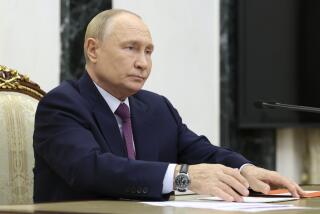A Weak Moscow Growls
- Share via
Russia has adopted a new national security doctrine that is as notable for its bleak recitation of internal dangers as for its perception that the United States and its Western allies present a growing threat to Russian interests. Under the Communists, as earlier under the czars, Russia tried to hide its domestic weaknesses from the outside world while inflating its claimed achievements. Now Moscow candidly advertises its woes, even as it proclaims suspicions--another element of a long tradition--that the West is plotting to undermine it.
Attracting the most attention in Western capitals is Moscow’s apparent increased readiness to use its nuclear weapons. It’s now prepared to “go nuclear” not only if Russia’s existence is in jeopardy, as an earlier strategic doctrine suggested, but “to repulse an armed aggression, if all other means of resolving the crisis are exhausted or have been ineffective.” The change is a confession of weakness. Russia’s conventional military capability has fallen apart since the collapse of the Soviet Union; one Russian security expert claims that Turkey’s military potential is now greater than Russia’s. The U.S. State Department says it doesn’t think the new doctrine marks a significant shift in policy, but concern is in order whenever the threshold for using nuclear weapons is lowered.
The doctrine looks unsparingly at Russia’s internal ills, including terrorism, organized crime and an enfeebled economy in which widening income disparities threaten social stability. Noted also is the emigration of some of the country’s most talented people and separatist movements within the Russian Federation.
None of this comes as news to ordinary Russians. Neither does the government’s priority on reviving the economy--including integration into the global economy--as the only path toward regaining the great power status whose loss virtually all Russians mourn.
There’s no question that Russia’s persistent domestic ills, including the increasingly costly war in Chechnya, have sapped national self-confidence. That is never a healthy thing politically, especially in a country that is only beginning to edge away from an unbroken history of authoritarian rule. The new doctrine, which has been signed by acting President Vladimir V. Putin, is remarkably self-critical. Still awaited is a coherent government approach for dealing effectively with Russia’s many problems.
More to Read
Sign up for Essential California
The most important California stories and recommendations in your inbox every morning.
You may occasionally receive promotional content from the Los Angeles Times.













